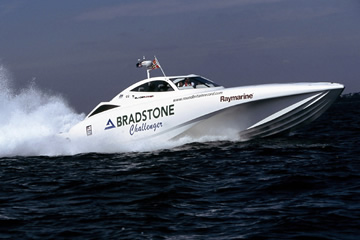 File on 4, an award-winning news show on the BBC , sat down with me last week to discuss illegal arms traffic. Part of the conversation turned to Iran’s appetite for high-performance boats, and that’s the piece that made it into this week’s File on 4 documentary.
File on 4, an award-winning news show on the BBC , sat down with me last week to discuss illegal arms traffic. Part of the conversation turned to Iran’s appetite for high-performance boats, and that’s the piece that made it into this week’s File on 4 documentary.
Allan Urry and the rest of the BBC crew did a great job. Give it a listen–I wish we had more shows like that over here.
At any rate, we talked about Iran’s new boat, the Bradstone Challenger. I still don’t understand why the Iranians kicked up such a fuss acquiring the Bradstone Challenger as they did–sneaking it out of South Africa. The boat is simply a performance-oriented variant of the Bladerunner 51 model that the Iranians could have gotten a with a lot less publicity/fuss (I’m fairly certain an exchange of blueprints would never have made headlines).
As I have said before, the Iranians could easily (and quietly) buy Bladerunner 51 vessels in Dubai and ride them across the Gulf, no problem–but getting such a “high-profile” vessel in a “high-profile” fashion has got to be a boost to the Iranian Revolutionary Guard mystique–and if there is one thing the Revolutionary Guard looooves more than anything, it’s good press.
For the Revolutionary Guard, the value of the Bradstone Challenger seems to have depended upon the vessel’s ability to boost the global perception of the platform as a potential threat. I feel like this is something of a bluff–The moment the Iranian Revolutionary Guard is not seen as the toughest bunch around, that group is going to encounter problems–both at home and in the Gulf.
So I’m somewhat nonplussed–I respect the achievement of the acquisition, but, as a weapon, what does it get Iran? Not much.
“Easy-riding” fast-boat designs have proliferated–the differences between mainstream Italian, British and, well, even Turkish fast-boat designs are pretty minor. Over time, the key to better performance will stem from the employment of high-tech materials and production methods–stuff that doesn’t lend itself easily to reverse engineering. So I’ve got to ask: Will the IRGC be content to harvest these “lower-profile” technologies, or will they continue to pursue the “high-profile” yet relatively low-significance pursuit of notable small vessels?
And will the West be as thorough in securing this tech as we are about securing “single” boats? I suspect, at this point, it would be easier to get the tech (the plans, materials and required production methods) than the final product itself. We’ll see.
And finally, will the Iranian Revolutionary Guard Corps obviate the advantages of their new acquisition by overloading it or doing a sloppy job of mounting weaponry on the boat? Or will they just load it with explosives and deploy as a potential suicide platform? Again, we’ll see.
In the meantime, the worldwide demand for “easy-riding” fast-boats will continue to grow, bolstered by military, smuggler and luxury-oriented markets. The question for everybody is how to best handle these new weapons. How do we manage them?
 Iran isn’t really a big threat, in itself. As far as Britain goes, the real small-boat threat comes from the increasing potential for miscalculation. As small boat performance improves, as they become operationally viable in weather and conditions that challenge even the best, most seasoned maritime surveillance assets, the margin for error gets very, very small.
Iran isn’t really a big threat, in itself. As far as Britain goes, the real small-boat threat comes from the increasing potential for miscalculation. As small boat performance improves, as they become operationally viable in weather and conditions that challenge even the best, most seasoned maritime surveillance assets, the margin for error gets very, very small.
Take this event–a recent confrontation off Gibraltar:
A [Spanish] Civil Guard patrol boat ignored warnings as it came close to the heavily armed warship HMS Somerset and the fast patrol boat HMS Sabre.
The two Royal Navy vessels were carrying out an anti-terror exercise in an area where ships are always on high alert for attacks…
…The 52ft (16m) Rio Tormes headed towards the two ships on the evening of June 1. The patrol vessel’s red, white, blue and yellow markings were difficult to spot because of the fading light, and they refused to identify themselves despite repeated requests from the British ships.
The Rio Tormes is usually deployed to stop drug smugglers and illegal immigrants from reaching Spain from north Africa.
Senior British military officials were said to be “furious” when they learned what happened, and said the Spanish ship risked being “blown out of the water” by its recklessness. A Navy source told the Gibraltar Chronicle: “Racing towards a well-armed warship is madness. It’s irresponsible and incredibly risky.”
Miscalculation is the real threat small, fast boats pose to the West–a threat that goes far beyond Iran. Let me put it this way–An accidental dust-up near Gibraltar would do far more damage to the West than the Iranian Revolutionary Guard could ever hope to achieve. (Seriously–Imagine what would happen with NATO? The UK-US alliance? The American base at Rota? It’d be a catastrophe.)
So really, the message here is short: Either we summon the courage to manage our fears or our fears will end up managing us–and lead us all into a real mess.
